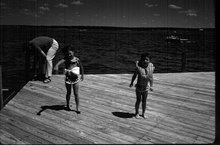
New York, 1985
She dreamed about time. There were places she would see when walking down a deserted downtown street, where time lifted her skirt and revealed something beneath the layers of the years. She could not explain this, how time existed in many layers at once, that when she met someone she could not tell whether she was seeing him in the present, the past, or the future. Some people she could only understand as "mythological" and others as existential imperatives. Such was her relationship to those who must be saved. They existed as eternal responsibilities, as opportunities for redemption.
He made her eggs the next morning, and they ate them wrapped in blankets on the cold wood floors of his Ft. Green apartment. He played Dizzie Gillespie on the turntable, which was vintage and scratchy, but sounded real, grabbable.
This was the state of Dewey's soul when he encountered Lizzie that day by the pond. While he was struck by the almost shell-like quality of the pain she carried around her body like a glaze, he was likewise aware of his contrary instincts to both protect and devour her. There was a variable at work here which did not exist in his other observations -- it was called desire, and he did not know the symbol he would use to represent it in any equation.
...objects are alive, they are witnesses…if you possessed the gift of touch then you might know that every single moment of time is preserved forever in the molecules of a room, or a chair, or a stone. If you possessed the gift of touch, then maybe you would become obsessed with cataloguing the stories that stretch out like long highways toward unknown places, and if you followed them, how would you ever find your way back home?
-from the journals of Grace Lightman
The human conscience balances on a fulcrum, leaning uncertainly into the past and the present, and that point, that finite but incomprehensibly elusive point of the present (which is its only true contact with anything solid) falls away beneath the mind and disappears from awareness. And yet, the physical laws governing a fulcrum exist within the context of the human consciousness, and should the mind become unhinged from this context, then the world comes unhinged from its laws.
When she returned from her wanderings, she seemed to possess a type of calm power. The hotel raised itself from the ground, its straight boards and smooth stones leveraged into place by some alchemy of her pain.
Are any events completely unrelated? How do things come together, at what points do they hinge, maybe even in the only moment they ever connect? How does CW Post relate to a girl walking alone along the Brooklyn streets at dawn, or a reclusive philosopher, obsessed with Kafka?
Math (chaos, physics, even economics—the connection between John Maynard Keynes and Einstein's relativity theory). AW Moore's article in the London Review of Books, "Millenium Problems" (July 22, 2004).
October 21, 1933
October 26, 1854
October 11, 1878



